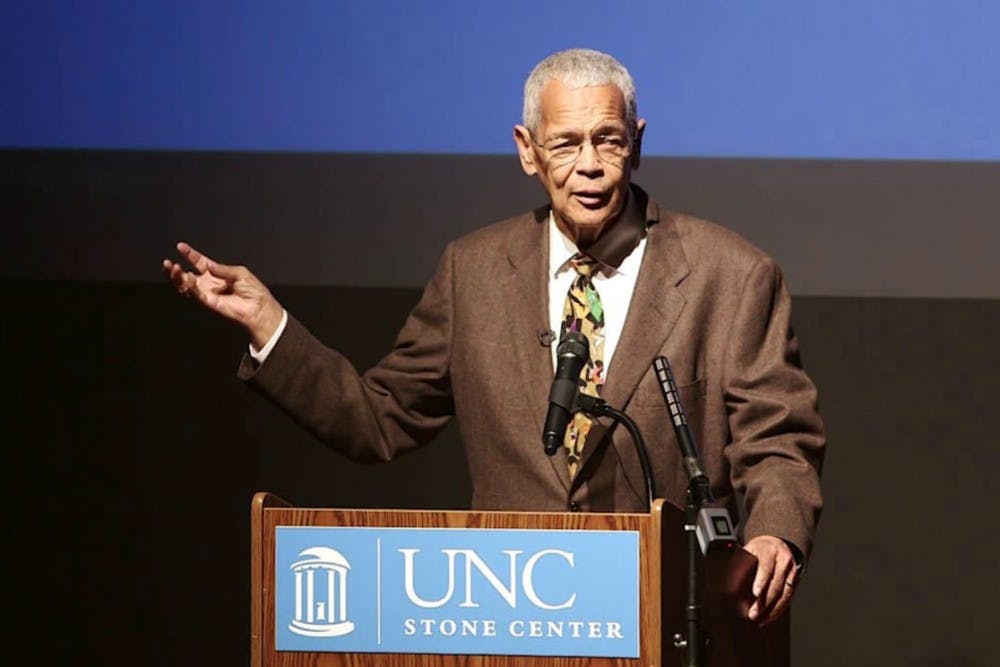“What I remember is him saying that he wanted people to ask
questions,” Janken said. “He didn’t want people to get up and make a speech, because that was his job.”
Terrell, now a senior double-majoring in global studies and African, African American and Diaspora studies, attended Bond’s lecture after a recommendation from Janken, her professor at the time.
“I’ll remember (Bond) as someone who was open to talking with people about the things he and his peers of the time struggled with and struggled for,” Terrell said.
Janken offered to introduce Terrell to the civil rights icon, but she said her nerves got the best of her before he left the center.
“(Not meeting Bond is) one of my biggest regrets, now that he’s passed away, that I didn’t let my favorite professor introduce me,” she said.
Bond accomplished a lot of firsts. He helped created the Southern Poverty Law Center, was a founding member of the Student Nonviolent Coordinating Committee — withwhose roots are soewn in the North Carolina sit-in movement — and was the first African-American nominee for vice president of the United States at only 27 years old.
Despite these pioneering moments, Joseph Jordan, director of the Stone Center, said he speculated Bond would be uncomfortable discussing his legacy.
“He was one of those folks in the movement who had a very recognizable name but really saw his role as working in the background, doing the kind of difficult work of organizing and keeping institutions functioning,” Jordan said.
Bond had an early introduction to civil rights activism through work with the student nonviolence group SNCC and a premature vice presidential nomination, according to Theodore Shaw, a UNC law professor and the director of the school’s Center for Civil Rights and UNC Law Professor. Bond had to withdraw his name because he was not constitutionally old enough to run for the position.
To get the day's news and headlines in your inbox each morning, sign up for our email newsletters.
“He didn’t wait for somebody who’s older to pass the torch to him,” Shaw said. “He took it and ran his leg of the race.”
Shaw said Bond’sthis involvement as a young man motivated others to take up the cause.
“At the age that the UNC students are right now, Julian Bond was fully engaged in the battle and the struggle for justice,” he said. “In some ways, he left us that young Julian Bond also as an example and an inspiration for young people.”
Shaw, a lifelong admirer of Bond’s, said he will always remember Bond’s influence as a young man.
“For me, there’s a piece of Julian Bond that remains forever young.”
Bond’s notability extended beyond the world of advocacy and into government, where he was first elected to the Georgia House of Representatives in 1965.
“Most of (the civil rights activists) didn’t go into politics,” Shaw said. “Julian Bond is one who straddled both worlds.”
Following white Georgia legislators’ refusal to seat him as a representative, Bond retained his seat by pursuing the case all the way up to the U.S. Supreme Court. He then served 21 years as both a Georgia representative and senator.
Shaw said Bond took on additional civil rights causes, including same-sex marriage rights — even when vocal members of the African-American community still refused to conflate same-sex marriage with the term “civil rights.”
“He never left the struggle,” Shaw said. “Julian Bond understood that justice wasn’t a limited commodity.”
A long-time colleague at the NAACP, Shaw said Bond’s impact is a testament to a lifetime of commitment.
“Julian Bond captured something that is difficult to articulate.”
@CLRlyCorey
state@dailytarheel.com



